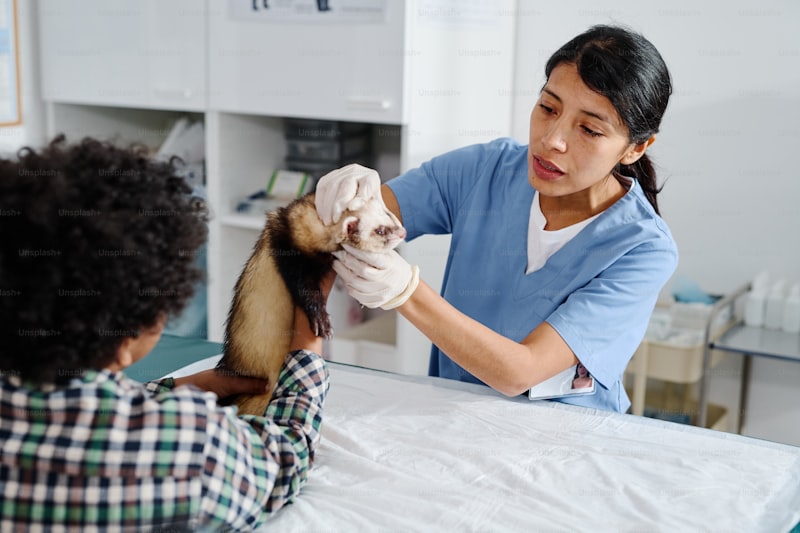First and foremost, maintaining your ferret’s health starts with a balanced diet. Ferrets are obligate carnivores, meaning their diet should primarily consist of meat-based protein. High-quality commercial ferret food or a mix of raw meats like chicken and turkey is ideal. Avoid feeding them fruits, vegetables, or dairy, as these can upset their sensitive digestive systems.
Regular veterinary check-ups are crucial for ferrets. They are prone to certain health issues such as adrenal disease and insulinoma, which can be better managed if detected early. Vaccinations against rabies and distemper are also essential to prevent serious illnesses.
Ferrets are highly intelligent and need mental stimulation to thrive. Provide plenty of toys that encourage their natural behaviors, like tunnels, balls, and puzzle feeders. Rotating their toys weekly keeps them engaged and prevents boredom.
Creating a safe environment is equally important. Ferrets are curious explorers and can easily get into mischief if not supervised. Ferret-proofing your home by securing cabinets, blocking off small spaces, and removing any toxic plants ensures their safety.
Ferrets are social animals and thrive in the company of others. Consider adopting a pair of ferrets so they can play and interact together. If you have only one ferret, ensure you spend quality time interacting with them daily through play and cuddle sessions.
Caring for pet ferrets requires a commitment to their unique needs. By providing a nutritious diet, regular veterinary care, ample enrichment, and social interaction, you can ensure your ferret lives a healthy and fulfilling life. Understanding their behaviors and responding to their needs will strengthen the bond between you and your furry friend.
Ultimate Guide: Ferret Health Essentials Every Owner Should Know
Owning a ferret can be an incredibly rewarding experience, but it also comes with responsibilities, especially when it comes to their health. Ferrets are curious and energetic animals, much like little explorers always on a mission. To ensure your furry friend lives a long and healthy life, it’s crucial to understand their specific health needs.
One of the most important aspects of ferret health is their diet. These small carnivores have a high metabolism and require a diet rich in animal protein. Commercial ferret food that is specifically formulated for their nutritional needs is ideal, supplemented occasionally with treats like cooked eggs or small amounts of fruits.
Regular veterinary check-ups are essential for ferrets. They are prone to certain health issues such as adrenal disease and insulinoma, which can be managed better with early detection. Vaccinations, especially for canine distemper, are crucial as ferrets are susceptible to this disease.
Ferrets are playful creatures, and their environment should reflect this. Providing ample space for them to explore and play helps keep them mentally stimulated and physically active. Safe toys and opportunities for social interaction are also vital for their well-being.
Grooming is another essential part of ferret care. Their coats should be brushed regularly to prevent matting, and their nails trimmed to avoid overgrowth. Ferrets are generally clean animals, but regular litter box cleaning is necessary to maintain hygiene.
Understanding the signs of illness in ferrets is key to prompt treatment. Changes in appetite, energy levels, or unusual behaviors should be monitored closely. Being attuned to these signals can make a significant difference in catching health issues early.
Caring for a ferret involves attention to detail and a commitment to their unique needs. By providing a balanced diet, regular veterinary care, a stimulating environment, and proactive grooming, you can ensure your ferret enjoys a happy and healthy life by your side.
Top 10 Tips for Keeping Your Ferret Happy and Healthy
Ferrets are curious and playful pets that bring joy to many households. Keeping them happy and healthy requires a bit of knowledge and attention to their unique needs. Here are ten essential tips to ensure your ferret thrives:

Provide a Spacious Cage: Ferrets are active animals that need room to move around. Invest in a spacious cage with multiple levels for climbing and exploring.
-
Balanced Diet: A proper diet is crucial for a ferret’s health. Feed them high-quality ferret food rich in protein and fats. Avoid sugary treats and stick to fresh water daily.
-
Regular Vet Check-ups: Schedule regular check-ups with a vet experienced in exotic pets. Ferrets are prone to certain diseases that can be prevented or managed with timely veterinary care.
-
Playtime and Socialization: Ferrets are social creatures that need daily interaction and playtime. Provide toys and engage in interactive play sessions to keep them mentally stimulated.
-
Frequent Exercise: Allow your ferret to exercise outside of the cage in a ferret-proofed area. They love to explore, climb, and dig, so provide tunnels and toys to keep them active.
-
Grooming Routine: Brush your ferret’s coat regularly to prevent mats and hairballs. Trim their nails as needed and clean their ears gently with a damp cloth.
-
Safe Environment: Ferrets are curious and can get into small spaces. Ensure your home is ferret-proofed by blocking off dangerous areas and securing cords and small objects.
-
Temperature Control: Ferrets are sensitive to heat and cold. Keep their environment between 60-80°F (15-26°C) and provide a cozy sleeping area with bedding.
-
Hygiene Maintenance: Clean the litter box daily and wash bedding and toys regularly. Ferrets are clean animals, and a tidy environment helps prevent health issues.
-
Educate Yourself: Continuously educate yourself on ferret care and behavior. Stay updated on best practices and seek advice from experienced ferret owners or online communities.
By following these tips, you can ensure your ferret lives a happy and healthy life. Remember, each ferret is unique, so observe their behavior and adjust care accordingly. Enjoy the playful antics and companionship your ferret brings into your home!
Discover the Best Foods for Ferrets: Nutrition Tips and Tricks
Have you ever wondered what makes a ferret’s diet truly exceptional? Ferrets, those curious and playful pets, have specific dietary needs that must be met for them to thrive. Understanding the best foods for ferrets can significantly impact their health and happiness.
Firstly, protein is paramount for ferrets. These carnivorous creatures require high-quality animal-based protein sources such as raw or cooked meat. Chicken, turkey, and lamb are excellent choices, providing essential nutrients like taurine that are vital for their wellbeing. Avoid feeding them plant-based proteins as their digestive systems are designed for meat.
In addition to protein, fats are essential for ferrets. They require a diet rich in animal fats to maintain their energy levels and coat health. Eggs and certain oils like salmon oil can be beneficial additions to their diet, helping to ensure they receive the necessary fatty acids.
When it comes to carbohydrates, ferrets are obligate carnivores, meaning their digestive systems are not adapted to process grains and vegetables efficiently. In fact, such foods can lead to digestive issues and should be avoided. Instead, focus on providing them with small amounts of treats like cooked eggs or pieces of fruits like banana or berries for occasional variety.
To further enhance their nutrition, consider offering supplements designed specifically for ferrets. These can help bridge any nutritional gaps and ensure they receive essential vitamins and minerals.
By providing a diet rich in animal-based proteins, fats, and occasional treats, you can ensure your ferret stays healthy and happy. Remember, their diet plays a crucial role in their overall wellbeing, so always consult with a veterinarian for specific dietary recommendations tailored to your pet’s needs.
Ferret-Proofing Your Home: Safety Measures Every Ferret Owner Must Take
So, you’ve brought home a curious little ferret friend – congratulations! These pint-sized bundles of energy are not only adorable but also incredibly curious and agile. Ferrets love to explore every nook and cranny of your home, which can sometimes lead to mischief if proper precautions aren’t taken. That’s why ferret-proofing your home is essential to ensure their safety and your peace of mind.
First things first, let’s talk about wires and cables. Imagine this: your ferret, filled with boundless curiosity, discovers a dangling cord and decides to investigate. It’s like an adventure playground to them! However, electrical cords pose a serious risk of electrocution if chewed on. To prevent such a shocking scenario (pun intended), secure all electrical cords and wires out of reach or use protective coverings designed for pet safety.
Next up, household chemicals and cleaning supplies. While humans understand the dangers of bleach or detergents, ferrets might mistake them for something tasty or intriguing to investigate. Store all chemicals in locked cabinets or high shelves inaccessible to your ferret. It’s a simple step that can prevent a potential poisoning and keep your furry friend safe.
Plants can brighten up any room, but some can be hazardous to ferrets if nibbled on. Avoid keeping plants like lilies, tulips, or ivy in your home, as they are toxic to ferrets. Opt instead for pet-safe plants or place inaccessible high spots that your ferret can’t reach.
Think like a ferret! Imagine your home from their perspective – small spaces, hidden corners, and cozy spots are irresistible to explore. Block off any small gaps behind appliances or furniture where your ferret might get stuck or hide away. Ensure that ventilation ducts and other openings are securely covered to prevent escapes or accidents.

Lastly, keep an eye on potential hazards during playtime. Supervise your ferret when they’re roaming freely, especially in areas like the kitchen or garage where dangers might be lurking. Remember, ferrets are mischievous and quick, so a watchful eye is your best tool for keeping them safe.
By ferret-proofing your home with these simple measures, you’re creating a safe environment where your furry friend can thrive and play freely. It’s all about striking a balance between a ferret-friendly space and a hazard-free zone. Ready to embark on this ferret adventure? Let the exploration begin!
From Play to Sleep: Creating an Enriching Environment for Your Ferret
Exploring the Play Zone: Your ferret craves exploration and adventure. Design their play area with tunnels, ramps, and hiding spots where they can scamper and burrow to their heart’s content. Think of it as their personal playground, stimulating their curiosity and encouraging physical activity. Incorporate toys like balls and tunnels that ignite their hunting instincts, ensuring they stay engaged and active throughout the day.
Comfortable Retreats: After an energetic play session, your ferret needs a cozy spot to unwind. Provide them with soft bedding, ideally made from materials like fleece or soft fabrics, where they can snuggle up and relax. Consider adding hammocks or sleeping dens elevated from the ground, mimicking their natural instinct to nest in safe, elevated spaces.
Nutrition and Hydration: Ensure your ferret’s habitat includes easy access to fresh water and a balanced diet suited to their nutritional needs. Place their food and water bowls in accessible locations, encouraging regular hydration and eating habits. A well-fed ferret is a happy ferret, brimming with energy for their next play session.
Stimulating Their Senses: Ferrets are highly sensory creatures. Enhance their environment with varied textures and scents. Introduce safe, natural materials like wood and cardboard for them to explore and chew on. Scatter safe, pet-friendly herbs around their play area to enrich their sensory experience, making their habitat both stimulating and enjoyable.
Safety First: Ferrets are known for their curiosity, so ensure their environment is safe and escape-proof. Check for gaps or openings where they could get stuck and remove any hazardous items that they might chew on. Regularly inspect their habitat for wear and tear, replacing worn-out toys or bedding promptly to maintain a secure and comfortable space.
Creating a Routine: Establish a daily routine that includes playtime, feeding, and rest periods. Ferrets thrive on consistency, so a predictable schedule helps them feel secure and reduces stress. Incorporate interactive play sessions into your routine to strengthen your bond and keep them mentally stimulated.
In Conclusion: Crafting an enriching environment for your ferret involves thoughtful design and attention to their natural behaviors. By providing a stimulating play zone, comfortable retreats, nutritious meals, and sensory stimulation, you create a habitat where your ferret can thrive and live their best life.
Health Check: How to Spot Common Ferret Illnesses Early
Keeping your furry friend healthy and happy starts with knowing the signs of common ferret illnesses. Ferrets are curious creatures, often exploring their surroundings with boundless energy. However, just like any pet, they can be prone to certain health issues that need early detection for prompt treatment.
One of the first things to observe is your ferret’s behavior. Are they eating and drinking normally? A sudden change in appetite or thirst could signal underlying issues. Additionally, watch for changes in their activity levels. Ferrets are typically playful; a sudden decrease in energy or reluctance to play might indicate something is wrong.
Regularly checking your ferret’s coat and skin is also crucial. Look out for bald patches, dry skin, or any unusual bumps or lumps. These could be signs of skin conditions or even tumors that require veterinary attention.
Another important aspect of ferret health is their litter habits. Any changes in urination or defecation patterns, such as frequency, color, or consistency, could indicate digestive problems or infections.
When it comes to respiratory health, ferrets can be susceptible to colds and flu-like symptoms. Watch for signs like sneezing, coughing, or nasal discharge that may suggest a respiratory infection.
Finally, keep an eye on their eyes and ears. Redness, discharge, or excessive scratching could be signs of infections or allergies.
By staying vigilant and knowing what to look for, you can catch potential health issues early and ensure your ferret gets the care they need promptly. Remember, a healthy ferret is a happy ferret!
Frequently Asked Questions
What are the best toys and activities to keep my ferret mentally stimulated
Discover effective toys and activities to keep your ferret mentally stimulated with our concise guide. Find out which toys encourage natural behaviors, such as tunnels and puzzle feeders, and explore engaging activities like hide-and-seek and supervised explorations. Keep your ferret happy and active with these recommended items.
What should I feed my pet ferret for optimal health
Discover the ideal diet for your pet ferret to ensure optimal health. Learn which foods are essential, balanced nutrition tips, and how to maintain their well-being through proper feeding practices.
How can I create a safe and enriching environment for my pet ferret
Learn how to create a secure and stimulating environment for your pet ferret with our concise guide. Discover essential tips and practices to ensure your ferret’s safety and well-being at home.
How do I prevent common health issues in pet ferrets
Learn how to prevent common health issues in pet ferrets with our concise guide. Discover essential tips on diet, hygiene, and regular veterinary check-ups to keep your ferret healthy and happy.
What are the signs of illness in ferrets and when should I seek veterinary care
Learn about the signs of illness in ferrets and when to seek veterinary care. Recognizing symptoms such as lethargy, loss of appetite, difficulty breathing, or changes in behavior is crucial. Immediate veterinary attention is recommended if you notice any of these signs to ensure prompt diagnosis and treatment.



